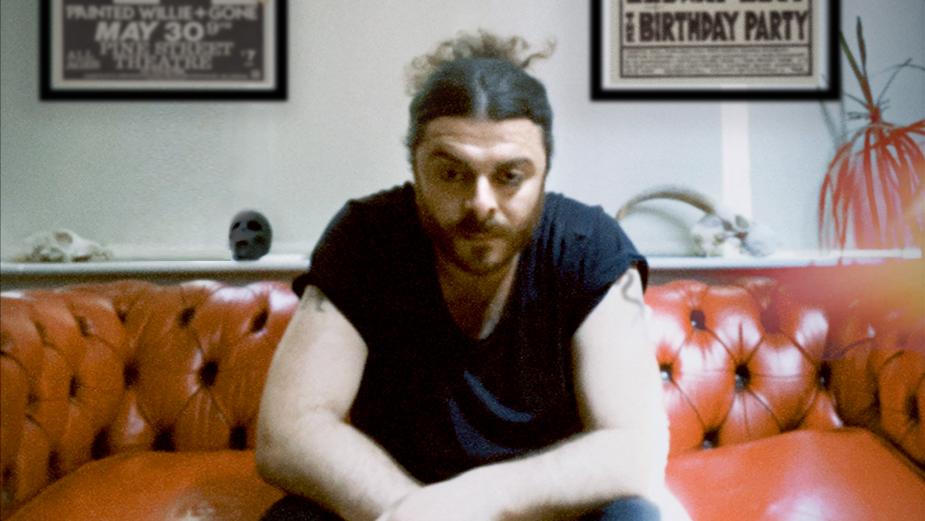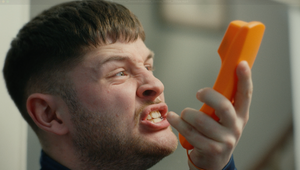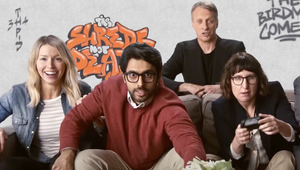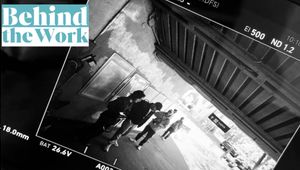
The Directors: Thomas James

Thomas James is a director whose work can be defined by its cinematic feel and poetic quality. A keen sense of a darker, magical realism often underpins his approach, while his love of cinema permeates every frame.
A UKMVA award winner, Thomas has been able to draw from his extensive music video experience creating original, narrative-led, cinematic concepts to present consistently engaging brand campaigns. For his latest collaboration with Fold7 for NatWest’s banking app Mettle, it was Thomas ’ music video experience and encyclopedic understanding of noughties rock that made him an obvious choice to direct.
In 2022, his debut commercial for ride-hailing app Bolt, was nominated for three awards at the British Arrows. Bolt kicked-off a busy year for Thomas which saw him hone his refined cinematic aesthetic for other brands such as Bell’s, Bloom & Wild and Ballantine’s.
Featuring 'This is England' star Michael Socha, 2022 saw the release of ‘Stay Down’, a short film for The Department of Opportunities that uses horror and surrealism to explore the class divide at work. The 60 second trailer was well-received both critically and creatively, picking up Campaign’s 'Ad of the Day' and Marketing Week’s 'Best Campaigns of 2022' along the way.
Represented by OB Management (UK) for commercials, music videos and short films, and 42 Management (Worldwide) for long form work, Thomas is currently in development on his debut feature film.
LBB> What elements of a project sets one apart from the other and what sort of projects get you excited to shoot them?
Thomas> I think the most important point on a project is that you connect with it. All parts of the equation; director, production, agency and brief, need to balance.
For me, it’s something that stands out, that is brave, or weird, or the initial call starts with a quiet hint of ‘how are we being allowed to make this’. No matter what it is, I like something that feels a little out of step.
LBB> For you, what is the most important working relationship for a director to have with another person in making an ad? And why?
Thomas> Honestly? Their family or partner at home. I realise that sounds gross and slushy. But bear with me.
It’s so easy to entirely lose yourself to the job you have on. I can only speak for myself, but sometimes work just becomes everything in the run up. It’s good to remember life exists outside of it sometimes I think. Perspective, space, a breather from the mill stone, might solve that issue you’ve been staring at for six hours.
Also, don’t be a knob-head to the PM. They look after you and everyone around you.
LBB> What’s the craziest problem you’ve come across in the course of a production – and how did you solve it?
Thomas> Every single job comes with a weird, idiosyncratic challenge of some sort. There will always be a hurdle, no matter how simple on paper something is. Shooting Christmas ads in June, and ‘cold’ carollers still need visible breath so you have to cast smokers, vaping off camera. Or you’re stood in a Polish warehouse, trying to figure out how many metallers you can fit in an ice cream van and still have the soft serve operational.
I think one of the most challenging moments came last year, when we did the campaign for Department for Opportunities. It was a short horror film, and a 60” pseudo trailer ad, which looked at and delved into classicism in the work place.
With two things quite dear to me, class war and horror cinema, so we obviously went quite big on it. The key to the creative, was a malignant force which held down the protagonist (and eventually began to tear his skin off). With no budget or time, it became quite a labour of love; which invariably saw me holding Michael Sorcha upside down by the feet for way too long, and then the evening we’d wrapped turning my living room into a studio, covered in mannequins and liquid latex and self shooting the plates for the VFX in what looked like a serial killers playground.
Sometimes you just solve it with sheer madness, rather than intelligence.
LBB> How do you strike the balance between being open/collaborative while also protecting the idea?
Thomas> I think if we’re talking about advertising alone here, I’d like to start by saying, always remember agency know the client. Directors (usually) do not. We haven’t been there for the three months of campaign development. Sometimes changes are coming from a grown-up place, not a childlike whim that we may scream about to our ever patient producers. And secondly, you do not know or understand every department or role in the process. People specialise for years in an element of the industry you will never know, to the depth they do, as a director. Listen to these people. It takes a village.
But having exonerated myself politely from what is to follow, there’s a phrase I think about a lot when people talk about these sort of things; “a camel is a horse designed by committee.”
It’s a journey, and if you’re on the right job, it initially feels like the stars have gracefully aligned. Everyone is hyped to get going, and you know somewhere in that empty void you call a chest, that it could be fucking great. You know why you’re there, and you want to do the best you possibly can. You battle and agonise over every detail with all camps, because you all know, you potentially have a great piece ready to go. Everyone is essentially pulling in the right direction, and everyone essentially wants what’s best for the film. These are the ones to covet what you think works. Protect the essence of what makes it great because ultimately when you’re in the edit; firstly it’s your head on the block if it’s shit.
And secondly, dying on a hill is sometimes worth it, and people will see your lifeless grin from way up high when it comes together. But don’t be a dick. Don’t be arrogant. Listen and pay attention, because sometimes you are wrong. But if you’re not, and you know you’re not, explain why. People will listen, if you’ve listened too. Everyone is there to try and do something great. And ultimately we’re all just humans doing something we maybe passionate about. We’re not saving lives in a burns ward.
And we all know, on very occasional jobs, (we have all done them), that camel that was a horse? It’s dead. Don’t flog it.
LBB> What type of work are you most passionate about - is there a particular genre or subject matter or style you are most drawn to?
Thomas> I think first and foremost with film making (no matter what the context) - story is king for me. Narratives that affect the viewer no matter what the format or the way in which they are delivered.
Genre and style, I think are perhaps a bit of a luxury within the advertising format though - especially if you’re drawn to the weirder, or darker side of things. But it’s always great when you are allowed the opportunity to do what you love, and what you’re good at, in any context. It’s about manipulating your style, to serve the story, and delivering what that needs, with your personal palette. There aren’t tonnes of psycho-surreal horror fashion briefs kicking around are there. So I often think it’s about applying what you do best, in the best way, for the story that needs to be told.
But other formats sometimes let you truly out the gates, unleash carnage and show off. It’s just a balance isn’t it.

Bring Me The Horizon - Strangers
LBB> What are your thoughts on opening up the production world to a more diverse pool of talent?
Thomas> Our industry, despite recent steps forward, is still upheld by nepotism, privilege (in an array of forms) and a non-meritorious set of rules. Obviously I think these doors should be marked with an x, and the homes in which they reside burnt to the ground.
LBB> What’s your relationship with new technology and, if at all, how do you incorporate future- facing tech into your work?
Thomas> All of these answers are chat-bot generated. Thanks, friendly robot / soon to be digital overlord. Take my job. Just give me a fucking cool new one, when you imprison me in the simulation.
LBB> Which pieces of work do you feel really show off what you do best – and why?
Thomas> That’s a real tricky question. Each job is different, isn’t it. Sometimes one element of your craft shines, sometimes another. I’m personally drawn to the jobs that let you go nut nut, while still delivering what is needed. Department for Opportunities was good for this, being allowed to get into some real drama with an exceptional cast, but likewise, still push some surreal madness within it.
Likewise, in being true to the story and what is needed, I think that Bolt is a nice example of being faithful to a feeling. We made it literally as we were emerging from lockdown, and trying to capture how that felt, was a strange experience - but likewise, I feel we served the emotion with the respect it needed.















